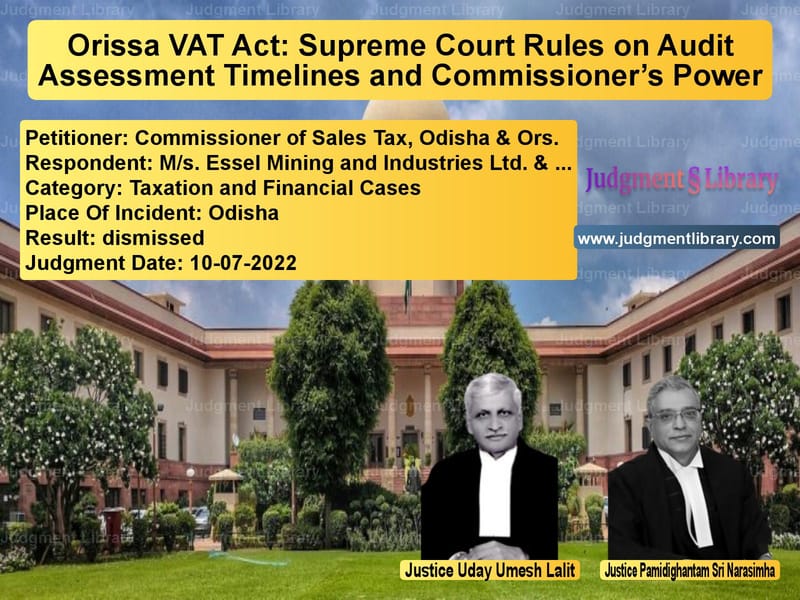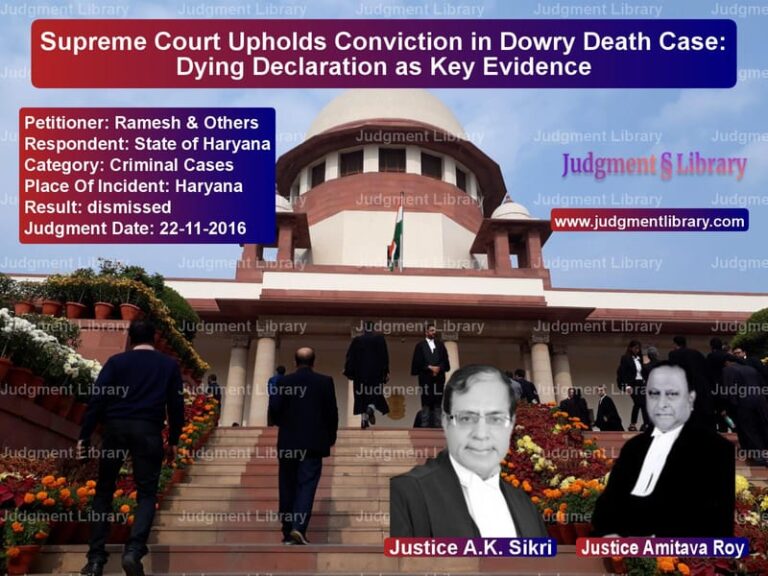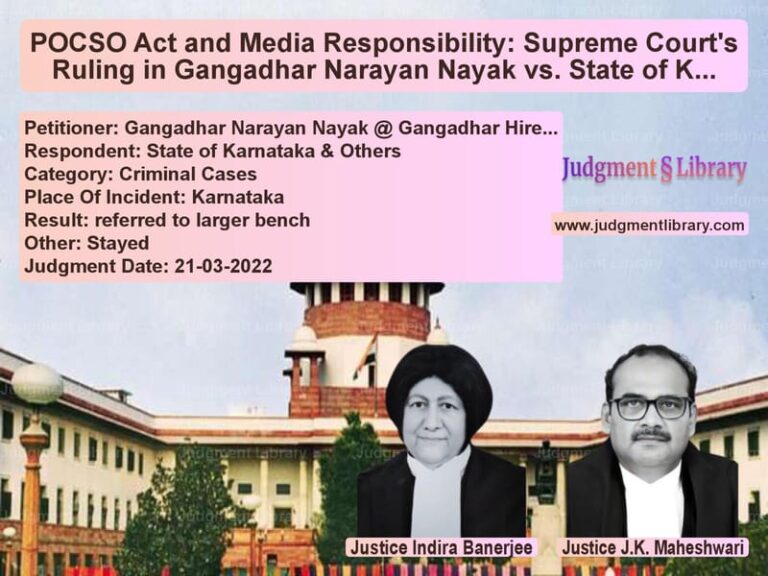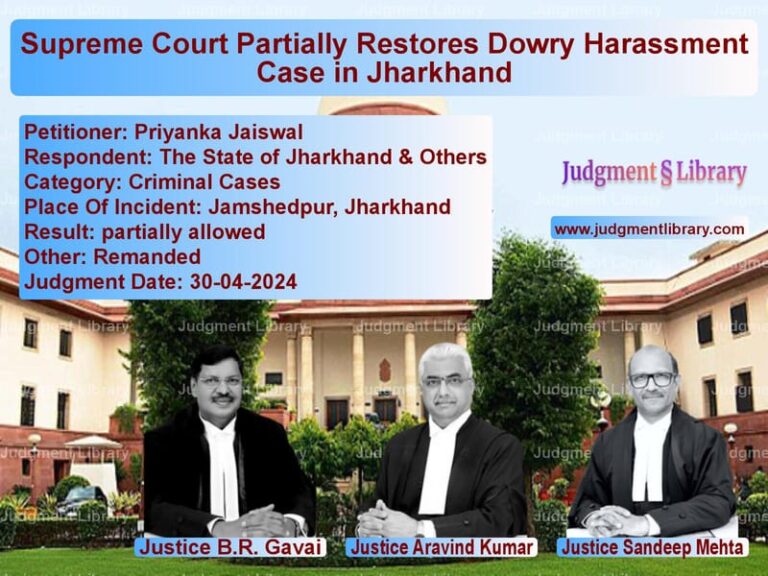Orissa VAT Act: Supreme Court Rules on Audit Assessment Timelines and Commissioner’s Power
The Supreme Court of India recently ruled on critical issues concerning the **Orissa Value Added Tax Act, 2004 (OVAT Act)** in the case of **Commissioner of Sales Tax, Odisha & Ors. vs. M/s. Essel Mining and Industries Ltd. & Anr.** The judgment examined the legality of audit assessment timelines under **Section 42(6) of the OVAT Act** and whether the Commissioner could grant an **extension of time post-facto** for completing assessments.
Background of the Case
The dispute arose when tax authorities conducted an audit of multiple dealers, including **M/s. Essel Mining and Industries Ltd., M/s. Shreem Electric Ltd., M/s. Cobra Instalaciones Y Servicios S.A., and M/s. Swastik Ingot (P) Ltd.** The assessments were initiated under **Section 42(6) of the OVAT Act**, which mandates completion within **six months from the date of the Audit Visit Report (AVR)**.
The Assessing Authority sought **extensions from the Commissioner**, but in some cases, the extension was granted **after the initial period expired**, while in others, it was issued verbally or retroactively. The Orissa High Court **quashed the assessment orders**, ruling that extensions must be granted before the expiry of the six-month period.
Petitioner’s Arguments (Odisha Sales Tax Department)
The State contended that:
- The Commissioner has the **discretionary power** to extend the assessment period even **after the expiry of six months**.
- The delay was due to procedural complexities, and **tax evasion issues** required additional time for inquiry.
- The High Court misinterpreted **Shreyans Industries Ltd. vs. State of Punjab**, which involved a different tax statute.
- Disallowing post-facto extensions would **adversely impact revenue collection** and encourage non-compliance by dealers.
Respondent’s Arguments (Essel Mining and Other Dealers)
The taxpayers opposed the assessment orders, arguing:
- The OVAT Act **explicitly limits** audit assessments to **six months**, extendable only **before expiry** of the period.
- Post-facto extensions violate **principles of natural justice** and create uncertainty in taxation.
- The High Court correctly applied **Shreyans Industries Ltd.**, which held that **extensions must be granted before limitation expires**.
- The Commissioner’s action amounted to **administrative overreach**, negating statutory safeguards.
Supreme Court’s Observations
The Supreme Court examined the legislative intent behind **Section 42(6)** and similar tax statutes. The key observations were:
- **Timelines under Section 42(6) are mandatory** to ensure finality in tax assessments.
- The Commissioner’s power to grant extensions is **not absolute** and must be exercised **before expiry** of the initial six-month period.
- Post-facto extensions **defeat legislative intent** and lead to **arbitrary tax administration**.
- Similar principles were upheld in **State of Punjab v. Shreyans Industries Ltd.**, where this court held that **tax assessment rights extinguish once limitation expires**.
Key Legal Precedents Considered
The Court relied on the following rulings:
- State of Punjab v. Shreyans Industries Ltd. (2016): Held that tax assessments must be completed within statutory timelines.
- CIT v. Ajanta Electricals (1995): Upheld that extension powers must be exercised **before** statutory deadlines expire.
- BHEL v. Commissioner of Commercial Taxes (2006): Clarified that time limits in tax statutes are meant to **protect taxpayer rights** and prevent administrative arbitrariness.
Final Judgment
The Supreme Court dismissed the appeals filed by the **Odisha Sales Tax Department**, ruling:
- The **Commissioner cannot grant post-facto extensions** under Section 42(6) of the OVAT Act.
- All **audit assessments exceeding six months without prior extension were invalid**.
- The **High Court’s decision quashing the tax assessments was upheld**.
Implications of the Ruling
This ruling sets a strong precedent for **time-bound tax assessments**, reinforcing that:
- Tax authorities **must adhere to statutory deadlines** and cannot extend assessments retroactively.
- Businesses gain **greater legal certainty**, preventing arbitrary assessments.
- The judgment **strengthens taxpayer rights** against administrative delays.
The ruling is a landmark decision ensuring **tax assessments remain fair, predictable, and within statutory limits**.
Petitioner Name: Commissioner of Sales Tax, Odisha & Ors..Respondent Name: M/s. Essel Mining and Industries Ltd. & Anr..Judgment By: Justice Uday Umesh Lalit, Justice Pamidighantam Sri Narasimha.Place Of Incident: Odisha.Judgment Date: 10-07-2022.
Don’t miss out on the full details! Download the complete judgment in PDF format below and gain valuable insights instantly!
Download Judgment: commissioner-of-sale-vs-ms.-essel-mining-an-supreme-court-of-india-judgment-dated-10-07-2022.pdf
Directly Download Judgment: Directly download this Judgment
See all petitions in Tax Refund Disputes
See all petitions in Banking Regulations
See all petitions in Income Tax Disputes
See all petitions in Judgment by Uday Umesh Lalit
See all petitions in Judgment by P.S. Narasimha
See all petitions in dismissed
See all petitions in supreme court of India judgments July 2022
See all petitions in 2022 judgments
See all posts in Taxation and Financial Cases Category
See all allowed petitions in Taxation and Financial Cases Category
See all Dismissed petitions in Taxation and Financial Cases Category
See all partially allowed petitions in Taxation and Financial Cases Category







